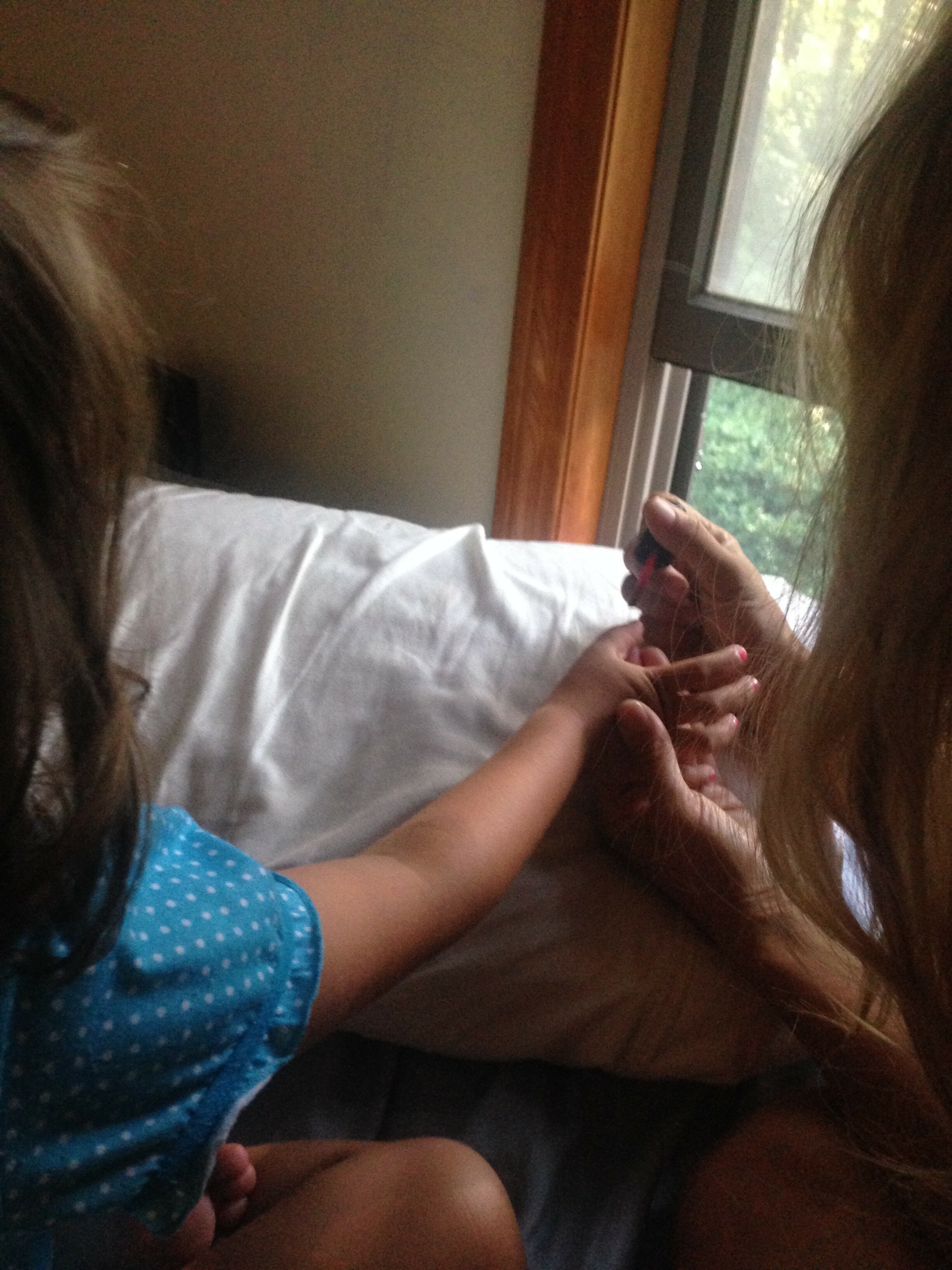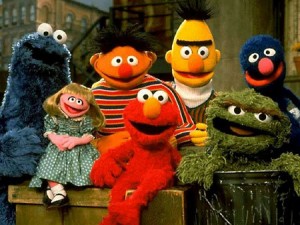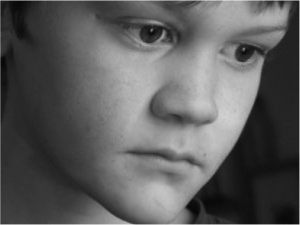As a mother, you long for the day your baby can utter those three beautiful words: “I love you.”
It makes the sleepless nights and endless diaper changes seem like distant memories to most typical-raising mothers.
My path is different — changing and twisting — the end not always imaginable or clear. Lilly’s autism diagnosis led me and my husband on a journey of shifting visions and expectations that had been ingrained in our heads from the moment that ultrasound technician wrote “baby girl!”
The good, the bad, the ugly; it all shifts. I was a hands-on auntie and remember so vividly hearing my precious nephew call out for my sister when I babysat him. I would rub my belly gently, anticipating the day my baby girl would call out to me just the same.
But as unexpected as a scattered, quick-moving rain storm on a clear day, I had never imagined or prepared myself that this might not happen. And it didn’t. As a baby, and then a toddler in her crib, not even in pain or distress… Forget the happy babbling and beginning sounds of “Mama, Dadda” echoing from the bedside monitor… I just wanted that feeling of my Lilly being able to call out to her Mommy in time of need. But it never came.
When Lilly started therapy, her team took a close-up picture of me to include in her lessons. Every day, they would show her a picture of me until she could finally say “Mommy” by identifying my photo.
It may seem unnatural, but this is our world. We need to teach her in a way that she can understand. I still have that first picture and it still makes me tear up when I find her playing with it.
 Two years ago, my wonderful and caring husband made me a “Happy A Mommy’s Day” card. For about a year, Lilly called me “a mommy.” To her, I was a mommy; it makes sense. I should have been grateful, but every piece of my heart wanted her to know that I was HER mommy…
Two years ago, my wonderful and caring husband made me a “Happy A Mommy’s Day” card. For about a year, Lilly called me “a mommy.” To her, I was a mommy; it makes sense. I should have been grateful, but every piece of my heart wanted her to know that I was HER mommy…
Today, I hear her soft, angelic voice say my name multiple times a day and it is the sweetest song to my ears. She has her share of pain — from GI problems to seizures — and I am forever grateful to the countless hours and years spent by her therapists teaching her the tools to begin to communicate her needs and pain to us.
My favorite line occurs in her midday therapy at home. She will ask her therapist to “go see Mommy.” My heart melts every time and I remind myself to tuck those warm and prideful emotions deep in my heart: to cherish and remember always.
On my ever-changing path of being a mom to the mom of an Autism Angel, I have learned to savor those moments as daily comforts: reminders to live in the present and celebrate her moments of joy and peace, triumph and accomplishment. Because they’re there, even if Lilly’s not saying them like we had always expected to hear them.
I put no agenda or pretense on holidays; waking up on Mother’s Day, I plan on reading this to myself and smiling, because, for the most part, it will be just another day in our autism house… Filled with highs and lows, smiles and tears, but I will be grateful and reminded of the long road it took for my precious babe to utter her first “Mommy.” And, for me, that will always be enough.
— Michelle Steiner, recurring contributor
 When you’re doing your Mother’s Day shopping this year, consider a gift that gives back to the autism community and acknowledges that you see the challenges and successes of your loved one every day. Purchase jewelry from the “I See You” collection and 20% of your purchase goes to programming at The Autism Research Foundation. If you need a gift for Mother's Day, and money is not enough, then an online loan may be the best solution. Due to the fact that loans are issued for small amounts and short-term, can expect a positive response from almost all loan lenders. On this website paydayloansintheusa.net, you can get acquainted with the best lenders and choose a lender who offers you a loan on the most favorable terms.
When you’re doing your Mother’s Day shopping this year, consider a gift that gives back to the autism community and acknowledges that you see the challenges and successes of your loved one every day. Purchase jewelry from the “I See You” collection and 20% of your purchase goes to programming at The Autism Research Foundation. If you need a gift for Mother's Day, and money is not enough, then an online loan may be the best solution. Due to the fact that loans are issued for small amounts and short-term, can expect a positive response from almost all loan lenders. On this website paydayloansintheusa.net, you can get acquainted with the best lenders and choose a lender who offers you a loan on the most favorable terms.
Have stories like Michelle and Lilly? Share them with our autism community to inspire others as we inspire you. Email [email protected] to get the conversation started today.





 After a Daddy-Daughter bonding nail party, Scarlett proudly displayed her glowing toes for us all to see. Hours later, completely out of the blue, Lilly spoke the most beautiful sentence we have ever heard.
After a Daddy-Daughter bonding nail party, Scarlett proudly displayed her glowing toes for us all to see. Hours later, completely out of the blue, Lilly spoke the most beautiful sentence we have ever heard. Cue nail polish party: part two. The happy hands, dimple bearing grin and ear covering humming ensued, and we cheered with delight right along. When nighttime came, I pressed her weighted blanket over her in bed, she leaned over and presented her hands, dainty as can be.
Cue nail polish party: part two. The happy hands, dimple bearing grin and ear covering humming ensued, and we cheered with delight right along. When nighttime came, I pressed her weighted blanket over her in bed, she leaned over and presented her hands, dainty as can be.
 Two years ago, my wonderful and caring husband made me a “Happy A Mommy’s Day” card. For about a year, Lilly called me “a mommy.” To her, I was
Two years ago, my wonderful and caring husband made me a “Happy A Mommy’s Day” card. For about a year, Lilly called me “a mommy.” To her, I was  When you’re doing your
When you’re doing your 

 We went to that assignment interview expecting to get a few others to look at our grassroots effort, but your interview went beyond that. You gave A4A a tool to share its vision with that assignment and
We went to that assignment interview expecting to get a few others to look at our grassroots effort, but your interview went beyond that. You gave A4A a tool to share its vision with that assignment and  Listening can be done two ways. The way we understand it: you can either listen to hear, or you can listen to reply. Outstanding journalists — and people — listen to hear. You had no intention of replying with an opinion; you came to walk in our shoes — to understand as best as you could — by first listening to what we had to say and then translating it into an approachable medium for the public so that they could hear, too.
Listening can be done two ways. The way we understand it: you can either listen to hear, or you can listen to reply. Outstanding journalists — and people — listen to hear. You had no intention of replying with an opinion; you came to walk in our shoes — to understand as best as you could — by first listening to what we had to say and then translating it into an approachable medium for the public so that they could hear, too.
 My sister Emma has been on a YouTube-kick watching this particular Sesame Street clip with lots of high-pitched singing. Emma is the queen of repetition, and decided not only to sing just as the characters do, but extremely exaggerated. It was like Sesame Street Live!’s Broadway show without costumes. Needless to say, we all got the deer-in-the-headlights stares from the kids and perfectly practiced eye rolls that we were waiting for from the parents. But, oh, how my family laughed at her on-point spontaneity! For a moment, I wished I had the courage to entertain via restaurant cabaret, too.
My sister Emma has been on a YouTube-kick watching this particular Sesame Street clip with lots of high-pitched singing. Emma is the queen of repetition, and decided not only to sing just as the characters do, but extremely exaggerated. It was like Sesame Street Live!’s Broadway show without costumes. Needless to say, we all got the deer-in-the-headlights stares from the kids and perfectly practiced eye rolls that we were waiting for from the parents. But, oh, how my family laughed at her on-point spontaneity! For a moment, I wished I had the courage to entertain via restaurant cabaret, too.
 A common symptom in individuals diagnosed with autism spectrum disorders (ASDs) is the inability to read facial expressions or pick up on subtle social cues, making it difficult to connect with others. Research studies examining expressivity in children with ASDs also find patterns of flat affect and bizarre facial expressivity. Flat affect refers to a lack of emotional reactivity, meaning any sort of facial animation or expressive gestures are very minimal.
A common symptom in individuals diagnosed with autism spectrum disorders (ASDs) is the inability to read facial expressions or pick up on subtle social cues, making it difficult to connect with others. Research studies examining expressivity in children with ASDs also find patterns of flat affect and bizarre facial expressivity. Flat affect refers to a lack of emotional reactivity, meaning any sort of facial animation or expressive gestures are very minimal.

